Many nutritionists have preached about the benefits of going vegan, but how beneficial is the diet really? That’s what some Stanford Medicine researchers tried to find out, and their results turned out to be more surprising than expected.
The recent study examined 22 pairs of identical twins and the effects of their dietary habits over the course of eight weeks. One twin was instructed to follow a strict plant-based diet (no meat, seafood, eggs, or dairy), while the other followed an omnivorous diet (including plants, meat, and animal products).
“Although it is well known that eating less meat improves cardiovascular health, studies on diet are often hampered by factors such as genetic differences, education, and lifestyle choices,” the study explained. “However, by studying identical twins, the researchers were able to control for genetics and limit other factors, since the twins grew up in the same homes and reported similar lifestyles.”
This is the first time researchers have conducted a study like this. It is also the first time that researchers have attempted to change people’s underlying biochemistry in a short period of time.
“We’re taking a holistic approach to this study, looking at body composition, the epigenome or biological clock, the microbiome and the brain,” said Christopher Gardner, a nutrition scientist at Stanford University.
The study is further explored in the Netflix food documentary “You Are What You Eat: A Twin Experiment.” The four-part series chronicles the study from start to finish and reveals its results at the end.
Four of the 22 pairs of twins appear in the series. They include sisters Pam and Wendy, who grew up in South Africa and run several food businesses together; brothers Charlie and Michael, better known as the “Cheese Twins”; sisters Carolyn and Rosalyn, sports relations coach and high school teacher respectively; and brothers John and Jevon, two recent nursing graduates.
Here are eight of the most important takeaways from the study:
The infamous Standard American Diet, better known as SAD, became commonplace in post-World War II society. Many would-be soldiers didn’t qualify for the military because they were too thin and malnourished, explained Christopher Gardner, a nutrition scientist at Stanford University.
“And there was a lot of effort to get enough calories and be as efficient as possible,” Gardner continued. “We saw a growing availability of prepared foods, many low-cost foods, which then began to transform into increasingly processed and packaged foods. And we saw the same thing with foods of animal origin. Beef, pork, chicken, eggs, dairy products, cheese.”
The livestock sector industrialized rapidly, and soon factory farms took over to improve efficiency, said physician and author Michael Greger. Animal products decreased in cost but increased in availability and overall consumption.
Cheap, ultra-processed foods remain a fundamental part of our food system today. High consumption of these foods has been linked to an increased risk of obesity, hypertension and cardiovascular diseases.
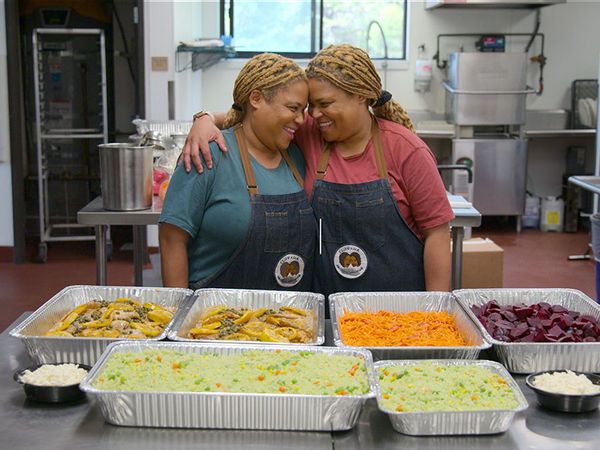 Pam and Wendy in “You Are What You Eat: A Twin Experiment” (Photo courtesy of Netflix)
Pam and Wendy in “You Are What You Eat: A Twin Experiment” (Photo courtesy of Netflix)After eight weeks of following their respective diets, Pam and Wendy lost muscle mass but increased their fat levels. Pam, who followed the plant-based diet, lost half a kilo of fat and almost seven kilos of muscle. Her sister Wendy, who followed the omnivore diet, lost almost four pounds of muscle and gained 0.3 pounds of fat.
It was later revealed that both sisters did not eat all of the food provided to them, simply because they felt that their individual diets contained high amounts of carbohydrates and beans. Because their bodies were not getting enough energy from food, they looked to their muscles for energy. Most of the muscle they had built in the gym was also used to fuel their workouts, which explains the loss of muscle mass and gain of fat.
 Carolyn and Rosalyn in “You Are What You Eat: A Twin Experiment” (Photo courtesy of Netflix)
Carolyn and Rosalyn in “You Are What You Eat: A Twin Experiment” (Photo courtesy of Netflix)To assess the impact of the diet on the women’s sexual health, a thermograph was used to measure genital arousal in Pam, Wendy, Carolyn, and Rosalyn. Temperature changes in each participant’s genitals were recorded while they watched their chosen pornography. The final results found that Pam and Carolyn, who followed plant-based diets, had greater genital arousal.
Pam experienced a 371% increase in her arousal compared to her sister who experienced a 288% increase. Carolyn experienced a staggering 383% increase, while her sister Rosalyn experienced a 212% increase.
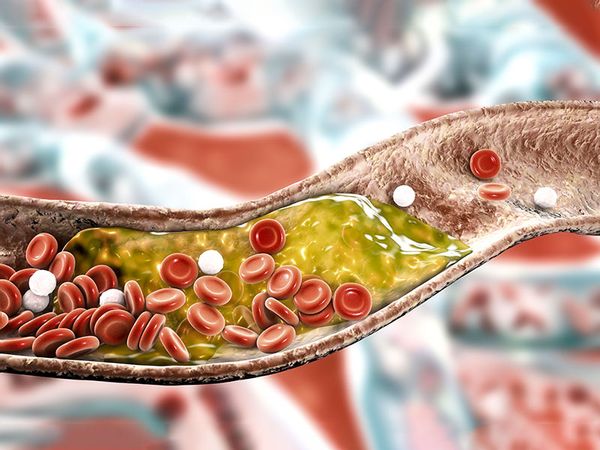 Atheromatous plaque in an artery, illustration (Getty Images/KATERYNA KON/SCIENCE PHOTO LIBRARY)
Atheromatous plaque in an artery, illustration (Getty Images/KATERYNA KON/SCIENCE PHOTO LIBRARY)A plant-based diet may contribute to lower levels of low-density lipoprotein cholesterol, sometimes called “bad” cholesterol. Over the course of eight weeks, researchers found that LDL cholesterol decreased significantly among those following a vegan diet.
Carolyn’s LDL levels fell by 12.9%, while her sister Rosalyn’s levels increased slightly by 1.7%. High levels of LDL cholesterol can clog arteries and lead to heart disease and stroke.
While omnivores in the study saw their LDL cholesterol stay the same on average, vegans saw their LDL cholesterol levels drop 10% on average.
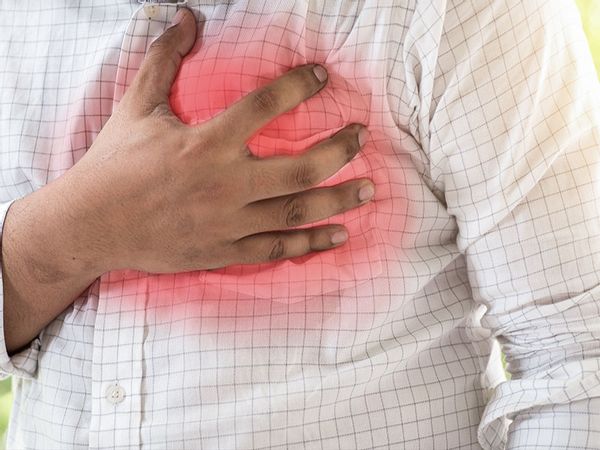 A man suffering a heart attack (Getty Images/boonchai wedmakawand)
A man suffering a heart attack (Getty Images/boonchai wedmakawand)The researchers studied the presence of trimethylamine N-oxide, known simply as TMAO, a substance produced by the body after consuming meat. TMAO is said to increase harmful levels of inflammation and is associated with an increased risk of heart disease.
As expected, omnivores had higher levels of TMAO compared to their vegan counterparts. Pam’s and Wendy’s results revealed that Pam’s OTMA plummeted 350% and remained low, while Wendy’s increased 160%.
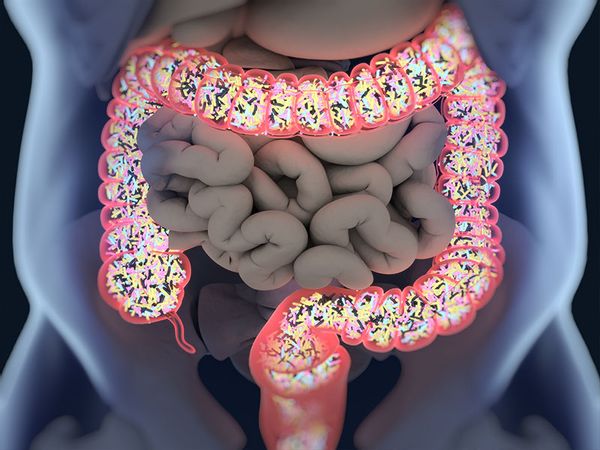 Gut bacteria, microbiome (Getty Images/ChrisChrisW)
Gut bacteria, microbiome (Getty Images/ChrisChrisW)A healthy microbiome (the collection of all the bacteria, fungi, and viruses that naturally reside in our body) leads to a better metabolism, a stronger immune system, and better overall health.
The researchers looked at several groups of bacteria, such as bifidobacteria, which help prevent infections and produce vitamins and other vital chemicals. Bifidobacteria increased in twins who followed a vegan diet and remained level in twins who followed an omnivorous diet.
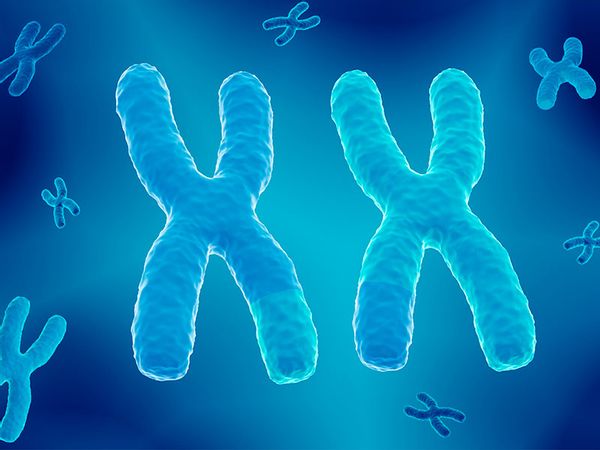 Chromatid crossing, illustration (Getty Images/ARTUR PLAWGO/SCIENCE PHOTO LIBRARY)
Chromatid crossing, illustration (Getty Images/ARTUR PLAWGO/SCIENCE PHOTO LIBRARY)The researchers differentiated between biological age and chronological age in their study. Biological age refers to the age of your cells and tissues, while chronological age is the number of years you have been alive. Biological age was determined based on the length of each twin’s telomeres, the protective caps at the ends of DNA strands. Telomere length decreases as we age, so longer telomeres mean better health and a younger biological age.
At the beginning of the study, each twin had telomeres of the same length. However, after eight weeks, the vegan twins had longer telomeres compared to their omnivore twins, whose telomeres remained unchanged. That means the vegan twins were considered biologically younger than their omnivorous twins.
 Michael, Charlie and Miyoko Schinner in “You Are What You Eat: A Twin Experiment” (Photo courtesy of Netflix)
Michael, Charlie and Miyoko Schinner in “You Are What You Eat: A Twin Experiment” (Photo courtesy of Netflix)Although neither twin has gone completely vegan, many said they are committed to eating more plant-based foods in their regular diets.
“For me, plant-based eating is the way to go,” Carolyn said. “I feel healthier. . . If I’m going to put shit in my body, then I’m going to feel like shit. But if I do the opposite, it will get better.”
As for Pam and Wendy, the sisters have been decreasing their consumption of animal products. When it comes to eating meat, “less is more,” Wendy said.
“Change starts with one person,” Pam added. “By making food for other people, we realize we don’t need as much meat.”
Michael expressed similar sentiments, saying he’s “cut out meat for the most part.”
“I think there are too many benefits to removing it and not enough to keeping it,” he said.
“You Are What You Eat: A Twin Experiment” is currently available for streaming on Netflix. Watch a trailer below, via YouTube:
Read more
about veganism: